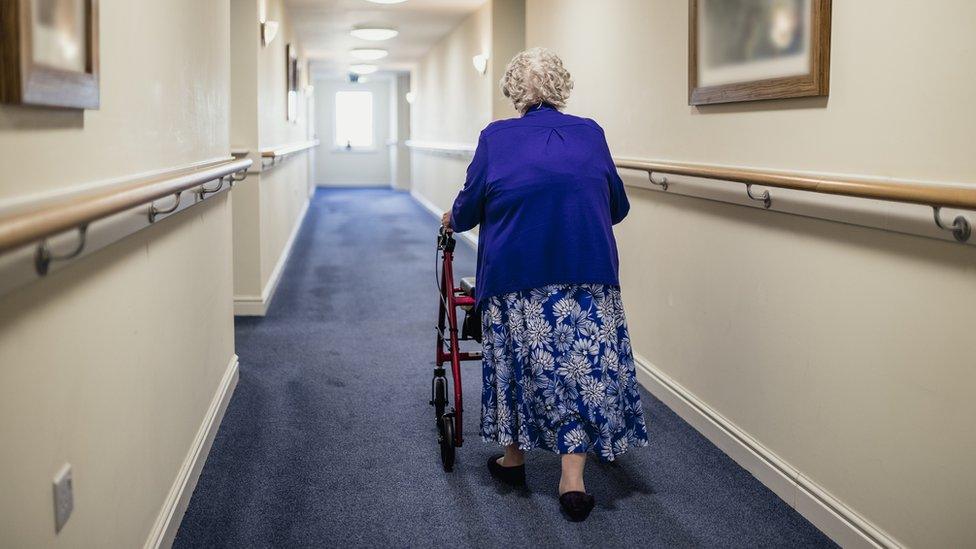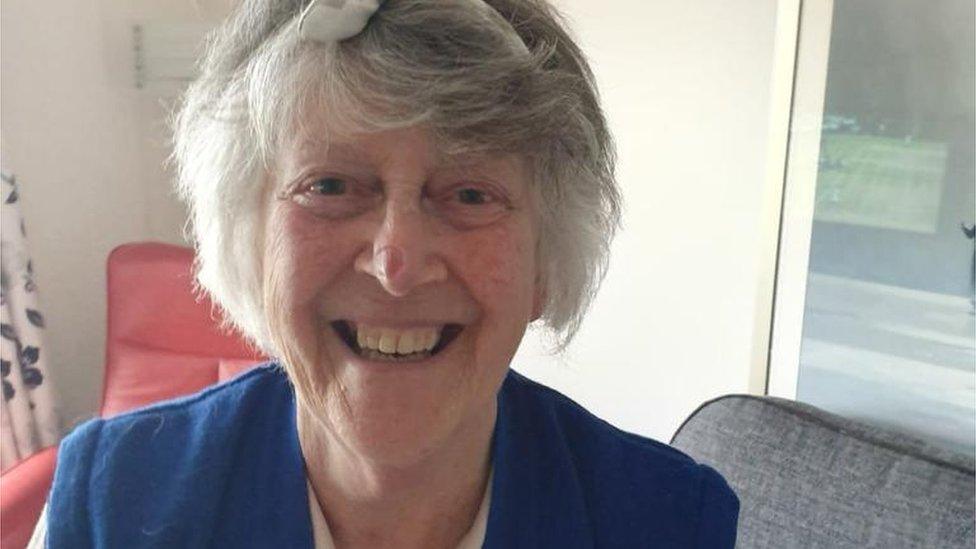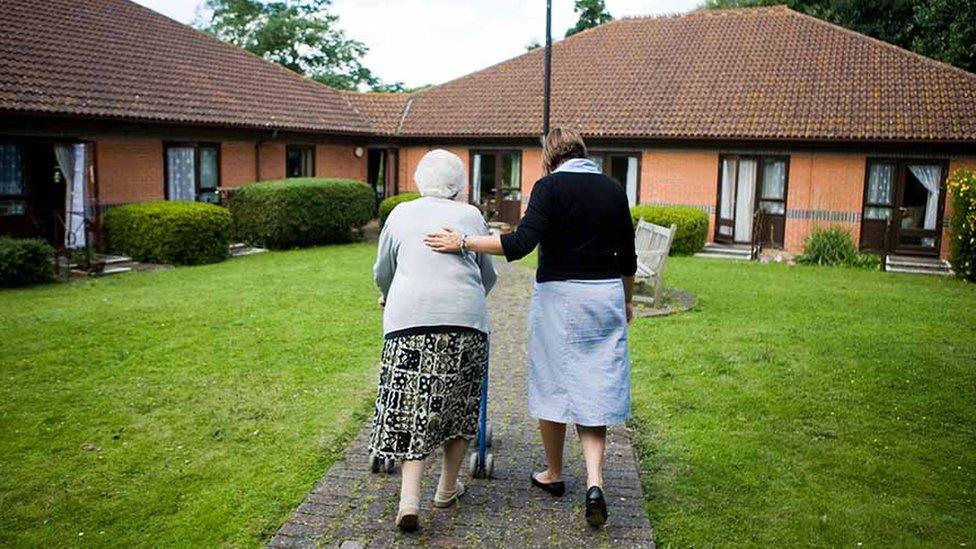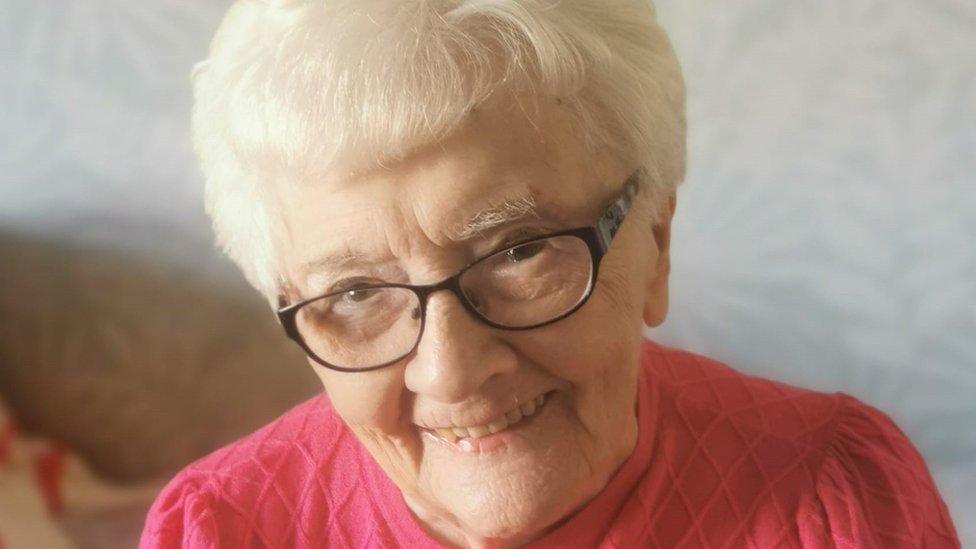Rural areas facing 'alarming' care home closures
- Published

Rising costs and a recruitment crisis are leading to an alarming rate of care home closures - especially in rural areas, care home leaders have warned.
New data from Public Health Scotland showed the number of homes across the country dropped by a fifth in a decade.
The care home sector said large parts of north and south Scotland could be left without publicly-funded places.
The Scottish government has already agreed to increase pay for social care staff to £12 per hour from April 2024.
The annual census of care homes in Scotland, external, which uses figures up to March 2023, showed a small decline in the number of care homes compared to last year.
There were 1,037 homes, a drop of 14 from the previous year - a 19% decrease since 2013, with private sector homes seeing a much smaller decline than local authority or not-for-profit homes.
In the past decade the number of registered places for residents also dropped by 5%.
Scottish Care, a membership organisation representing the independent social care sector in Scotland, said the figures did not "tell the full story".
They claimed that smaller care homes have been closing and re-registered by larger organisations in many instances, and that there is a disproportionate loss of care homes in rural areas which makes local care "impossible".
Scottish Care chief executive Donald MacAskill told BBC Radio's Good Morning Scotland programme: "What we're finding increasingly is particularly rural, remote and small care homes and charitable-run care homes are having to close at a rate that we've never experienced before.
"Data may indicate just a marginal change but it's the story which lies behind that of care homes being taken over by other organisations, the changes that that brings because smaller and family- run and charities aren't able to make the sums add up."
The number of local authority homes were also decreasing - while the annual care home census said the percentage of care homes for older people run by the private sector increased from 69% in 2013 to 76% in 2023.
Mr MacAskill described it as an "abandonment" of older citizens and warned that without intervention, "huge areas of rural and remote Scotland, both in the north and the south, will not be able to offer care that is local".
He said fewer beds were available for publicly-funded residents in Scotland's care homes because of inadequate funding provided by the Scottish government and Cosla, the umbrella body for councils.
The care home census showed the average gross weekly charge for a publicly-funded resident was £848 without nursing care and £910 with nursing care.
However, it stated that the gap between that and fees for self-funded residents had been growing over the past decade and now cost £1,214 without nursing care and £1,328 with nursing care.
"If you are lucky enough to have a care home in your area and you can afford to pay, you will receive care," Mr MacAskill said.

Ron Taylor, managing director of Parklands Group which owns 11 care homes in Moray and the Highlands, said costs had risen "exponentially" in the last two years and care homes were effectively having to provide "complex care on the cheap".
"Food costs, utility costs and interest rates just haven't kept pace with where we are, and more and more care homes are closing by the day," he said.
"We need to pay more, it's as simple as that, and the Scottish government have effectively refused to pay more."
In September's Programme for Government, First Minister Humza Yousaf announced a new base rate of pay for social care staff of £12 per hour from April 2024, increasing from the current rate of £10.90.
Mr Taylor described the pay offer as "too little, too late".
"I can honestly say it's the worst I've seen it," he said.
"We look after people who are blessed with old age, they've given their lives to the community and now I feel we are letting them down."
A letter last week led by the Coalition of Care and Support Providers in Scotland (CCPS) claimed the new rate was not enough and sent a message to social care staff that they were only worth the bare minimum.
The signatories of the letter included Age Scotland, Barnardo's Scotland and Oxfam Scotland, and warned that low pay was driving care workers to better-paid jobs elsewhere.
A Scottish government spokesperson said they were "working with partners to improve social care services and deal with the challenges the sector faces" in providing "vital" support.
They added: "We've increased funding and pay rises for social care support staff to help deal with the consequences of reduced staffing because of Brexit, the pandemic, and rising costs of energy and inflation, and are working towards our commitment to increase spend in social care by 25% by the end of this Parliament, an increase of over £840m."

'My mum is not a piece of furniture'

Frances Thomson's family fear she may have to be moved to another care home
For Lee Thomson, putting her 82-year-old mother into a care home was one of the most difficult decisions to make.
Frances Thomson, a former primary school office worker who now has dementia, has settled into McClymont House in Lanark, but her family is faced with the heartache again.
The council-run site is under a consultation process that could result in its closure.
"This is where she lives, this is where her family are, her friends can still visit," Ms Thomson, a nurse, told BBC Scotland.
"My mum is not a piece of furniture that can be moved from place to place to place. She's a human being and her mental health and her physical health will suffer."
Ms Thomson said it took many heartfelt discussions as a family to decide to move Frances into a care home in the first place, and that the guilt was "still terrible".
Knowing that her mother was happy and safe, and feeling like her daughter again rather than just her carer, compensated - but the prospect of the home closing was a "major worry".
Prof Soumen Sengupta, director of health and social care at South Lanarkshire Health and Social Care Partnership, said the care home's future was not yet decided.
"We recognise that the consultation process may be an anxious time," he said, but added that there was a recurring budget shortfall of £21m for adult and older people's social care in South Lanarkshire, and that there were "no easy decisions" when "bridging that sort of budget gap".
Related topics
- Published24 May 2023

- Published10 December 2022

- Published16 July 2023
